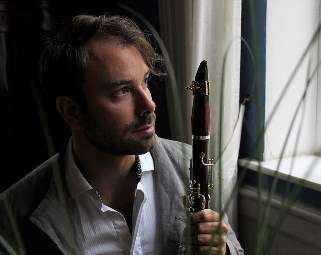|
Back
Heavenward New York
Rose Studio, Lincoln Center
02/15/2018 -
Louis Spohr: Duo in E minor for Violin and Viola, Op. 13 (*)
Wolfgang Amadeus Mozart: Quintet for Clarinet and String Quartet, K. 581
Chamber Music Society of Lincoln Center: Tommaso Lonquich (clarinet), Nicolas Dautricourt (*), Danbi Um (violins), Matthew Lipman (viola), Timothy Eddy (cello)

T. Lonquich (© Anna Grudinina)
“Japanese, Chinese, Russians, Africans, Americans and Europeans are today in communion one with another, at least in that heartbeat where they surrender themselves to the work of Mozart.”
Gernot Gruber, Mozart and Posterity
Okay, okay. After 65 years of studying music I feel that it is time to pick a favorite piece. For me it is the quintet on tonight’s program. It is formulated in a sacred style that should appeal to both religious people and true lovers of nature. I have heard it played on old Oehler wooden clarinets and hundreds of versions utilizing the more modern (if perhaps a bit less eloquent) instruments. With a great clarinet player one can literally feel the breath and hear the breath of life in the music. For me, this is Nirvana.
Contemporary critics and music historians praised the hands of the pianist Rachmaninoff (they were huge) but few spilled as much ink about his ear. His was a very sensitive aural palette as illustrated by the flute solo in the middle movement of his Piano Concerto No. 2 which melts into a singular passage for solo clarinet that may very well be the greatest aural moment in the history of post-Wagner music.
Or on the popular side of the artistic spectrum, for the American television series Monk the clarinet was utilized as an instrument of profound sadness, poignancy and spiritual restitution. The story of a detective who suffered from OCD and then lost his beloved wife in a mysterious murder was a very complex and highly emotional police drama. Mr. Monk (Tony Shaloub) portrayed this haunted man who played the clarinet. The most affecting moments in the series were when the spectral snatches of clarinet music – a leitmotif for his wife and their relationship – sneaked into his thoughts. For example, Mr. Monk is buried alive and realizes that he has only about 30 minutes worth of air in his casket. He settles in with a big smile on his face as the clarinet sidles into the background music of the scene and he thinks about his beloved Trudy whom he will soon join. Mozart wrote to his father about this magical sound and its supra-musical properties. In both the concerto and this quintet he utilizes its otherworldliness to express the most poignant of emotions.
Louis Spohr’s duo is as unfamiliar to this critic as the Mozart is within his bloodstream. Perhaps this allows for a fairer analysis if not as much enjoyment. Mr. Dautricourt’s gorgeous tone joined Mr. Lipman for this reading which might be best described as Beethoven with a touch of the frontier. There is the overwhelming voice of the exercise book in this piece, but also a strange kinship to many of the folk-inspired works of Bartók. An interesting contrast was the minuet in this piece and the ecstatic Menuetto in the Mozart. Oh well, it’s difficult to measure up to possibly the greatest composer in music history.
Unfortunately, the performance of the Mozart was a major disappointment. Although the strings all hit their notes expertly – Ms. Um was first violin for this performance – there was something glaringly missing. As best as I can express it there was simply no there there. A heavily Romantic approach did not ring true and went directly against the subtlety and mystery that were Wolfgang’s stock in trade. The light touch was submerged by a rather heavy-handed approach in the strings and a positively irritating stance of the clarinetist. Of course, they are young and perhaps have not yet begun to appreciate the rich subtlety of the master. Mr. Lonquich never exhibited the realization that he would benefit tremendously by achieving and implementing a lighter touch.
Years ago I went with a clarinetist to a recital where the two works on the program were the Mozart in the first half and the Brahms quintet in the second. Afterwards my friend said “The Mozart is easy but the Brahms is extremely difficult; come to think of it the Mozart is hard as well!” For these young people I would simply comment that all things get better with time.
Fred Kirshnit
|